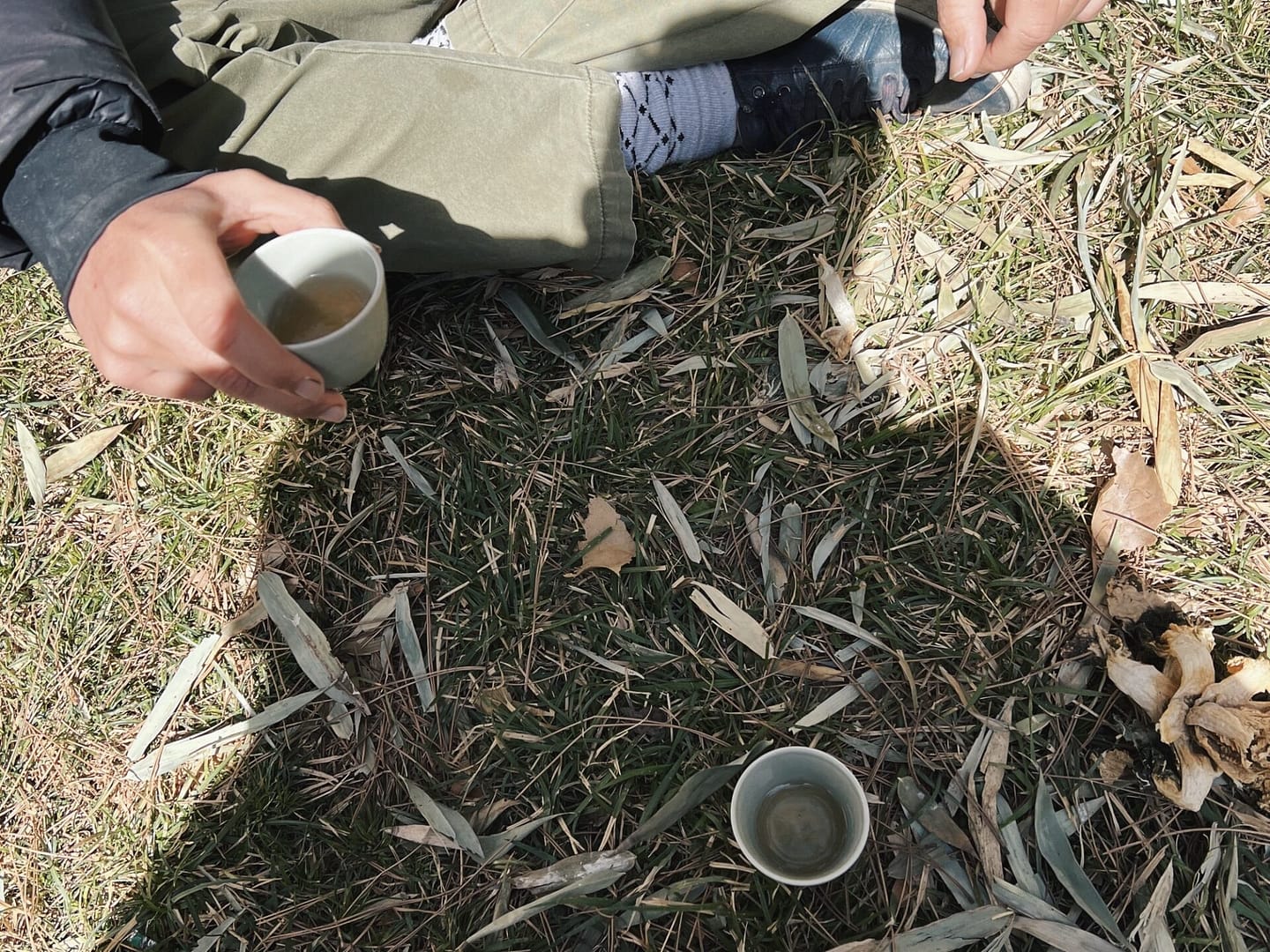The moment I lift my eyes from my phone and look around, I feel a sense of arrival. My forehead muscles relax and I can feel my glasses drop to a resting state—defense mode. The sounds around me are much louder but also subdued at the same time. This is the exhale to what felt like holding my breath the entire time I was on my phone.
Colors are much richer in the real world, which is obvious, but why do I feel it needs to be said? Last year, a friend reminded me over some tea: “Sometimes we forget, we are a part of the world.”
Sometimes we forget, we’re not just minds and souls trapped in a body—I remember learning in my first Philosophy class in college—we are our bodies. Growing up, I was convinced that we were minds first, and bodies second. I attribute this rather strong belief to my constantly being sick as a kid, and to my being the smallest in class.
I had always felt that my real essence as a human being existed as electric signals in the brain. And the body was a mere accessory that came with the package. I wasn’t unhealthy per se, but I can think of numerous occasions when my body chose to betray me. Or maybe I just felt I had more control over my mind than I did over my body.
In one of his interviews, ex-club promoter turned podcast host Chris Williamson answers the question: “Mental strength or physical strength?”
“Physical strength,” he says, “mental strength is downstream from it. Trying to think your way out of overthinking is like trying to sniff your way out of a cocaine addiction, and you can’t really change the mind with the mind. You have to change it with the body first. So going for a walk will do way more for your mood than sitting and thinking about and vacillating about whatever is dealing with you.”
“The two work simpatico together but for me, if you do not have a physical practice of some kind and you’re struggling with mental health, you need to look at the physical side before you look at the mental side. That is the foundation. That’s the raw material of what your mentality is going to grow out of.”
I heard this clip a few weeks ago during a quick workout break. It was a fitting moment of validation for me as I’ve committed to working out more this year. So far, I’ve spent more time in the gym last month than the previous two years combined.
I’ve always acknowledged the importance of a sound mind in a sound body but I don’t think I believed it enough. And it showed in all my blood test results and all the getting sick right before or during big trips. For years, I’ve prioritized the intangibles—knowledge work, reading and writing, self-awareness, skill-development—which is not a bad thing, but I’ve also let go of the physical. My body was by no means a temple.
In a 2016 conversation with retired Navy SEAL Jocko Willink, Neuroscientist and author Sam Harris shares an interesting thought:
“Bravery is this maybe unique emotion in that you can’t fake it, because faking it is actually bravery. If you’re terrified and you’re merely acting brave and going through the motions and putting yourself in harm’s way—that is what bravery is. [For] great many other emotions, the counterfeit version of it is, in fact, the counterfeit. But it’s the real thing if you’re terrified and you’re then doing the thing that you’re terrified to do.”
“Yes, yes,” Jocko replies, “To fake bravery is in fact to be brave.”
Seven years later, serial entrepreneur Alex Hormozi talks about a similar thing: “Judge yourself by your actions, not by your thoughts.” He clarifies in a conversation with Chris Williamson:
“Patience is a virtue that I feel like I haven’t had and it’s been something that I’ve spoken over myself for many years. I was like, ‘I’m an impatient person, I want things fast, etc.’ When I realized that I should use the same lens that I judge other people on when I judge myself, which is someone might say, ‘I’m a really honest guy,’ but if I have no evidence that you’re an honest person or when I put you in a situation where you could be honest and you’re not, I would say, no, you’re not. Now, that person probably thinks of themselves as honest or to the same degree, ‘I’m a really loyal guy,’ but as soon as I put a 10 in front of you and you’ve got your your girl at home you jump, you’re not that loyal. You just haven’t had the opportunity to show that you’re loyal.”
“And so for me, my thoughts about what I thought I was were actually really negative, but when I try to think, ‘OK, well I can be patient if I act patient even if I don’t feel patient.’ And then that allowed me to start giving myself a stack of undeniable proof that I am who I wanted to be.”
“I think that motivation and patience are exactly the same,” Williamson adds, “If you’re patient despite not feeling patient, that is patience. Yes, that is how it works.”
What I take from all of this is a little wake-up call to appreciate the tangible, just as much as we value the abstract. This is not to say that we should be more materialistic, but rather, as Garyvee would put it, “clouds and dirt.” While our heads are up in the clouds, our feet should at the same time be on the ground, in the dirt. We can dream high and think big, but only in reality does action exist.
Not materialistic but grounded.
And maybe Dumbledore wasn’t entirely right when he said to Harry: “Of course, it’s happening in your head, Harry, but why on earth should that mean that it is not real?” Our thoughts are real to us, but unless we act on them or share them, why does it matter to the rest of the world?
I love ideas, the exchange of ideas, the deconstruction and reconstruction of ideas, the combining of two very different ideas. My favorite hobby, which is writing on this thing, is built on the foundation of thinking and rethinking ideas. But as I’m appreciating the physical world more, I think none of these matter if they’re not grounded—or to be grounded—in reality.
I also just love the feeling of finishing an essay, or even just writing unfiltered thoughts on a journal, because of the space it allows me after. I can finally get out of my head for a bit and experience reality unobstructed by the endless chatter. I think what I’m saying, if anything, is to do more of that thing that takes us out of our heads and into a state that appreciates reality.
Our modern world trends heavily towards our virtual lives, knowledge work, and meta spaces. Again, not entirely a bad thing. But along with it should come an equally heavy attention towards our physical bodies, real-life relationships, and tangible environments—touch grass, as the young ones say.
That feeling we get when we look up and notice the slowness of everyday life, that feeling is ready and constantly waiting to be felt. We’re often told to disconnect to connect, which is wise advice. But I think we should also go a step further to not just get off our devices but to also get out of our heads, take better care of our bodies, and just be on the earth. Real life happens in the real world.

